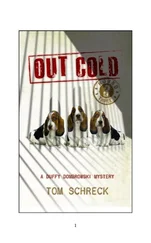Sigurd quickly sensed the mood of the assembly. 'Kari!' he thundered. 'You have offended our hospitality gravely, but in a just cause. With my permission, you may leave this hall unharmed. But I declare that by your action you have brought upon yourself the same outlawry for which you were condemned in Iceland. For that reason you must leave Orkney without any delay, and not return until your sentence of exile has been fully served.'
Kari said nothing, but turned on his heel and, the blood-streaked sword still in his hand, walked back quietly down the hall to where Kolbein and I were still standing. As he passed us, we both made a movement to step forward and join him. Kari nodded to Kolbein and said quietly, 'Let's go,' but to me he said firmly, 'you are to stay. I have brought you to Orkney as I promised, but you have not had time to carry out your own mission. I hope everything goes well for you. Perhaps we will meet again some day.' With those words, he stepped out of the door and into the darkness of the night. I stood watching him walk away, with Kolbein at his shoulder, until I could no longer see them in the gloom.
The earl was quickly back to his role as a genial host. Even as Sigurd's guards hauled away Gunnar Lambason's body, the earl was calling for more drink to be brought and a moment later was shouting at the cooks, demanding to know how much longer it would be before they could serve up the oath boar. I suspect that he was secretly delighted that the spectacular events would make his Jol festival remembered for years to come. The housemaids and thralls washed down the tables, and to his great credit Flosi stood up and in a loud voice asked the earl if he might have permission to retell the story of Njal's Burning, but this time with proper regard for the heroism of Njal and his family. When Earl Sigurd waved his hand in agreement, Flosi turned to the audience and announced that he would start the tale all over again, right from the beginning. His listeners nodded approvingly and settled themselves down for a lengthy discourse. Not only do Norsemen have an insatiable appetite for such narratives, but the more often a tale is told the better they seem to like it.
Flosi had barely started when Sigurd's steward was pushing through the crowd to where I was standing. 'Are you the young man who arrived with Kari Solmundarson?' he asked. 'Come with me,' he said. 'The earl wants a word with you, and so does his guest of honour.' I followed the steward through the crush of people, and found myself standing beside the earl's high seat.
Sigurd looked me up and down and asked my name.
'Thorgils,' I replied.
'How long have you known Kari?' asked the earl.
'Not very long, sir,' I answered respectfully, 'I helped him last
year before the Althing, but just for a few days. Then he invited me to join him on his voyage to Orkney.' 'Why was that?' asked Sigurd.
'Because he knew that I wanted to come here to enquire about my family.'
Before Sigurd could ask me what I meant, the man seated on his right interrupted, 'What a remarkable fellow that Kari is,' he said, 'walking straight in, and carrying on his blood feud under our noses, with no thought for his own safety. Great courage.'
'Kari has always been known for his bravery,' replied Sigurd, and his slightly deferential tone made me look more closely at his guest. He was the most expensively dressed man I had ever seen. He wore at least three heavy gold rings on each arm, and his finger rings glittered with magnificent coloured stones. Every item of his clothing was of the finest material and in bright colours. His shoes were of soft leather. He even smelled richly, being the first man I had ever met who used body perfume. His sky blue cloak was trimmed with a broad margin of gold thread worked in an ornate pattern, and the precious brooch that held the cloak to his left shoulder was astonishing. The pattern of brooch was common enough. The pin pivoted on a slotted ring, and the wearer drove the pin through the cloth, turned the ring and the cloth was held in place. My father Leif had worn one very similar at feasts. But he had never worn one anything like the brooch displayed so ostentatiously by Sigurd's guest. The brooch was enormous. Its pin was nearly the length of my forearm, and the flat ring was a hand's span across. Both the pin - spike would be a better description — and the flat ring were of heavy gold. Even more amazingly, the surface of the gold ring was worked with intricate interlacing patterns, and set into the patterns was a galaxy of precious stones carefully picked for their colours — amethyst, blue, yellow and several reds from carmine to ruby. The brooch was a masterpiece. I guessed that there was probably no other piece of jewellery quite like it in all the world. It was, I thought to myself, a work of art fit for a king.
Earl Sigurd had already turned back to his dandified guest without waiting to hear my further explanation about why I wanted to visit Orkney. He was deep in conversation with him, and I caught a scowl from Sigurd's steward, who had been hovering in the background. Realising that my presence next to the high seat was no longer required, I made my way quietly back to the steward.
'No eavesdropping on matters of state,' he growled, and for a moment I thought he might know about my role as a spy for Kari at the Althing.
'Who's the man wearing the superb brooch?' I asked him.
'That's Sigtryggr, King of Dublin, and he's come here to negotiate with Earl Sigurd. Sigtryggr's looking for allies in his campaign against the Irish High King, Brian. Knowing Sigurd the Stout, I doubt that he'll be able to resist the chance of winning loot, even without the added attraction of that meddling hussy, Kormlod.'
The steward noticed that I had not the least idea what he was talking about, and beckoned to one of the hall servants. 'Here, you. Look after this lad. Find him something to eat and a place to sleep. Then something useful to do.' With that I was dismissed.
The Jol ended with the ceremonial quenching of the Julblok, a large burning log whose flames were doused with ale to ensure the fertility of the coming year, and when most of the guests had left I found myself assigned to domestic duties. Twelve days of uninterrupted revelry had left a remarkable mess in the great hall and the surrounding area. I was employed in sweeping up the debris, collecting and burning the rushes that had been fouled on the floor, raking out the long hearth, swabbing down benches, and digging out patches of sodden earth where the guests had relieved themselves without bothering to go to the outside latrines. At times I wondered whether the cattle in the byres at Brattahlid had not been more sanitary.
King Sigtryggr was still with us and some sort of negotiation was going on because I noticed that he and Sigurd the Stout spent
a good deal of time in Sigurd's council room, often accompanied by their advisers. Among these advisers was Sigurd's mother Eithne. As had been reported, the celebrated volva was surprisingly well preserved for her advanced age. She must have been over seventy years old, but instead of the bent old crone that I had expected, Eithne was a small, rather rotund old woman full of energy. She bustled about, turning up at unexpected moments and casting quick glances everywhere and missing very little that went on around here. Only her thin, scraggly grey hair gave away her age. Eithne was almost bald, and she had a nervous habit of adjusting her headscarf every few moments so that no one would see her pate.
Her ears, as well as her eyes, were collecting information. I had barely begun to question the older servants about their memories of a certain Thorgunna, who had stayed at Birsay one winter fifteen years before, when I received another summons. This time it was to Eithne's retiring room at the back of the great hall. I found the earl mother standing so that the light from a small window fell directly on my face as I entered. Most windows in Norse houses are no more than open holes in the wall, which can be closed with a shutter in bad weather or when it is cold outside, but it was a mark of Sigurd's wealth and status that the window in his mother's chamber was covered with a sheet of translucent cow horn, which allowed a little of the dreary north light of winter to fall on me.
Читать дальше








